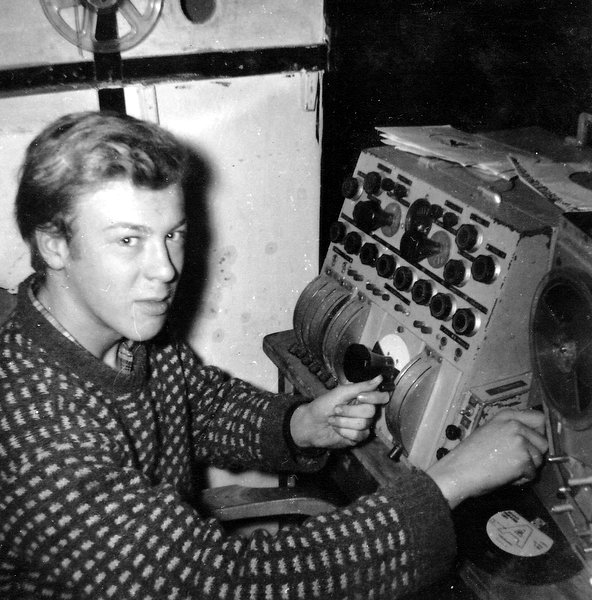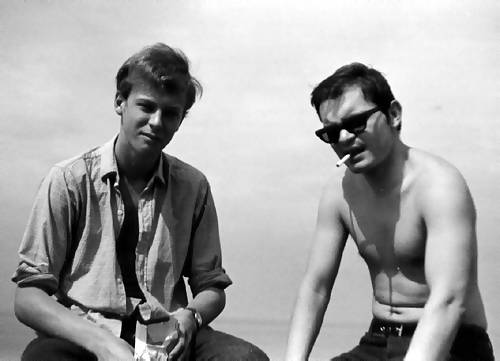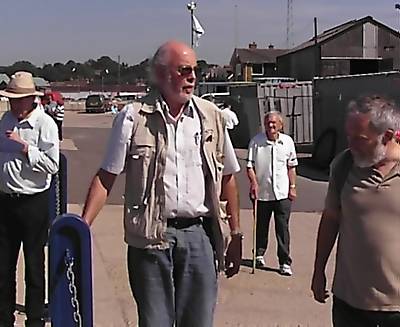Guy Hamilton recalls life on Knock John Fort
|

|
|
Guy Hamilton. Photo from his own collection. For more of Guy's pictures, see here.
|
“Fifty years ago I was a hapless teenager, not looking forward to A-level exams and wishing I was out on one of them thar pirate stations.
Being keen on amateur radio at school, I used my long wire MW aerial at Woodford in Essex, and on a clear day with a following wind could pick up the 200 watt strains of Radio Essex on 222 metres. At night, their anarchic offering
of ‘The Essex Beat Club’ appealed, and I contrived to invite DJs Vince Allen and Mike Curtiss to a school gig in Woodford.
I liked the sound of anarchy out at sea, and got a tape together to send to the Essex boss Roy Bates. The tape was excellent, which was more than could be said for the contents. Anyway, Major Bates liked my browner-than-average
teenage tones and offered me a job, unpaid to start with of course... Give him his due, Roy refused to let me come when he learnt I hadn't yet sat my exams, but told me to come back afterwards.
So, just one day after A-levels, I was making my way out to the fort on Mo's little fishing boat Kestrel, not really knowing what to expect. Some hours later and having completely fouled up the impossible task of making a pot of tea
on a violently tossing little boat, we got close to Knock John Fort, looming out of the sea some 20 miles out of Southend. Somehow I had to get on to it. I wanted my mum...
Learning to jump from the bow of a vigorously pitching boat on to a very un-vertical ladder, leaning in all directions and covered in seaweed, was not easy. The next bit was funnier. One plank led from the top, at about 45 degrees
and quite a few feet above the water at any tide, to the base of another vertical ladder, which had mercifully recently replaced just a rope, up to the main deck of Radio Essex's base. Within days of course, I was like the others
fearlessly (recklessly?) clambering about like a monkey, unfettered by any health-and-safety considerations to dampen the fun. Including at very low tide when the Knock John sandbank showed, learning to swim!
I'd always wanted to be a DJ, just like at the school dance. Nobody had mentioned peeling spuds, loading diesel, cranking the genny, or hoisting a container of sea water just to wash and ablute. But it made us very fit, and you
don't want unfit broadcasters do you? Thanks in particular to a lovely bloke called John Knight, I learnt to speak proper, and it wasn't many days before I was let loose on the 3-6am ‘Night Owl’ show. This could be a
spooky shift (literally: the fort was haunted) and seeing the twinkling lights of Kent and Essex in the distance could make for a lot of homesickness after a few weeks out there. But Radio Essex was at the time the only
English-language radio show on the air: all other stations switched off about midnight or even earlier in those days. So lorry drivers and bakers and other lonely night people wrote in their droves, well OK, half a drove then, and
I was the happy recipient of cakes sent by grateful bakers, complete with forts in the icing. I progressed to the breakfast show and others, and developed a taste for the good music which we were pumping out. Most of this was
‘easy listening’ or ‘MOR’ (middle-of-the-road) music, with light relief provided at 7pm by ‘Essex Goes Pop’ and at midnight by that freewheeling EBC prog, where essentially anything went. I
remember real rock-n-roll was popular, and thanks to American ex-DJ/salesman Harry Putnam, we had a good library of oldies. Listening to Dave Sinclair taught me the
finer points of big band music too.
|

|
|
Guy Hamilton and David Sinclair. Photo from David's own collection. For more of his pictures, see here.
|
Visits by the tender, weekly if lucky, were celebrated by playing a particularly long album track and going to help the ‘chain gang’ pull all the supplies up on a rope. Not much was lost, but there
were some big splashes! Without the tender's visit, feelings could become mutinous. On a clear day following storms and a long period without fresh anything, the usual verbal codes (A0, B0, C0 etc, indicating zero supplies remaining
of food, water, cigarettes, etc.) were replaced by a day of murderous DJs playing every known version of ‘Last Cigarette’ and ‘Last Chicken in the Shop’ and ‘Cool Clear Water’.
At 18 years of age, there was a lot of useful learning, mucking in and camaraderie which I think set up most of us for future life within the normal human community. Personally, I discovered one should never criticise the cook
(otherwise pie was fed to fishes) or the music choice (largely a self-blame process anyway) and to wash once a week even if you didn't need to...
Looking back almost 50 years, it was a bloody marvellous start to adult life. Who cared about the exam results? (In my whole career, nobody ever asked me about them, by the way).
Several of us from Essex, on its demise, progressed to Radio 270 off Yorkshire, where we helped replace a more mutinous crew who'd quit because of the boat's qualities, or lack of them. Rough? Yes, but luxury compared with the
tribulations of Knock John Fort.
Swingin' E-type people still get together to enjoy each other's company. Testimony to the fact I think that it was just great fun. Wish I could do it again!”
Guy Hamilton
“Story 1:
Action: Disc Jockey (me) playing records and getting the next one cued up. Microphone on and my left hand on the next disc. I start to speak when a very loud explosion goes off.
Action: Noise generated is too loud not to mention, so mic. on again and apologise for the noise. And I say that I will go out on to the fort's deck and see what had happened. Once I get out there it is plain to see what
had happened.
Action: Return to the studio, fade out the music, turn on the mic. and make the following announcement: ‘This is Radio Essex. If anyone can still hear us, please could you phone our office in Southend and tell them that
our aerial mast has collapsed and now hangs inverted in the Thames Estuary. This is Radio Essex closing down.’
Story 2:
The ladder on the north tower of Knock John fort aka Radio Essex.
There was rough weather and there was a crew changeover taking place. As we approached the fort on the supply vessel, the tender captain secured a rope to the fort, using the only remaining original ladder still fixed to it.
As the sea conditions worsened and became quite rough, the skipper was pulling on the rope to hold the tender close to the fort so that everybody could get up the ladder. I was the last person on the tender. The captain told
me to go to the boat's engine and follow these directions to position the boat: the calls of ‘forward’ and ‘aft’ echo out and then a final call of ‘neutral and run’. This went very well
and I was soon ascending the rusty old World War II ladder. As I started to pull myself up the final rung and into the fort, there was a very load crunch, followed by a bang as the supply tender hit the ladder. It was a narrow
escape. We were very lucky that no one was hurt.
Story 3:
Food Glorious Food.
There was a very small 2 ring gas cooker with a mini oven. We would take it in turns to cook meals. I used to make a chocolate and vanilla cake for the team, supplies permitting. On one occasion all we had was a large sack of flour,
lots of tea and very little fresh water. Using some of Knock John's supply of 1950's water with our water treatment tablets added, we survived on flour and water pancakes, water to drink and tea leaves to smoke.
Story 4:
What is in a name?
Well, before I joined Radio Essex I was on King Radio. We were recruited for their ‘soon to launch’ high-power station Radio 390 (on the Red Sands fort in the Thames Estuary) and each of us had to
have a name. Those of us who were not already members of the actor's trade union Equity received a special letter from union HQ. In it they said that according to union rules you could not work on stage or in the media without
membership. And here is the catch, you could not join in the fun unless you were a member. So you could not get membership unless you had a job and were working. In our case we already had the job so they had to offer us membership.
I had taken my Christian names of John Stewart as my broadcasting name but because this was so close to Johnny Stewart who was the Top of the Pops producer at the time I was asked to change it. So I became Chris Stewart - and this
went well until I later joined Radio Caroline North where my fan mail and that of Bob Stewart kept on getting muddled. As the ‘last one in’, I changed my name again and became John Aston which is the name I have been using
to this day.
|

|
|
Chris Stewart on Whitstable harbor front, prior to the 40th anniversary trip out to Knock John in 2006. Photo by Guy Hamilton. More pictures from the event here.
|
Story 5:
There was one thing that was common to both the WWII forts and the offshore broadcasters on the radio ships. That was how bad weather could affect the mail service. The forts were worse in bad weather as, to get alongside a fort,
one required a calm sea - a heavy sea could easily sink a visiting vessel. We, that is all the radio stations, would eagerly await the arrival of the letters, some of which would cover pages of paper. On Radio Essex, one short letter
that comes to mind came from a lady who wrote to me every day. She made a habit of writing not only to me, but also to Tony Blackburn. Her correspondence consisted of a comparison of what was going on during our programmes. She
would say that Tony's programme was jumping up and down energetically whereas mine was far more relaxed. A few weeks later we had a bit of a problem on the Knock John fort concerning our supply of small Calor gas cylinders - the
small blue ‘camping-gaz’ size, which we used for cooking. The next day we had a message from our Southend-on-Sea office which said that this lady, who was an old age pensioner, had sent us some money to purchase new gas
cylinders. It was very kind but not what broadcasting is all about, so we had a whip-round for this good lady. Meanwhile Tony and I continued our contrasting presentations. P.S. Tony had previously been on Radio Caroline and had
moved to Radio London about a month before this story occurred.”
John Stewart aka Chris Stewart aka John Aston
Our thanks to Guy and Chris.
As Guy says above, the Radio Essex team have enjoyed a number of reunions - probably more than those of any other offshore station. We have pictures from gatherings in 2006,
2008 and 2015. In 2006 they also organised a boat trip out to Knock John.
|

